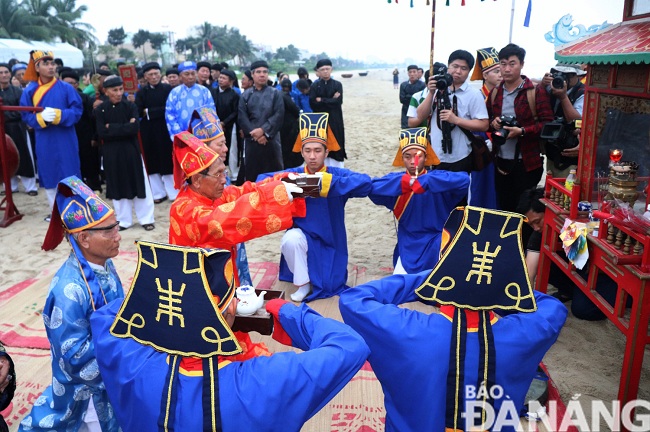Developing locally-held festivals into special tourism products
Although Da Nang does not possess global-level cultural heritage like other provinces and cities, it boasts numerous festivals, especially folk ones associated with cultural characteristics, the habit and customs of local people. If properly and fully tapped, these festivals will become special tourism products for the city.
 |
| A main traditional ritual to honour the merits and virtues of the whale during the Fish Worshipping Festival |
For many years, Da Nang is well known for the brand “Fireworks City”. Held for the first time in 2008, the Da Nang International Fireworks competitions (DIFC), currently known as the Da Nang International Fireworks festivals (DIFF), has emerged as an important cultural and tourism event, contributing to cultural exchanges with foreign countries, and wooing many foreign tourists to Da Nang, and Viet Nam as a whole.
Thanks to this much-awaited event, there has been a significant upward trend in the number of domestic and foreign visitor arrivals. In 2017, in May and June alone, the city received nearly 1.3 million visitors, an increase of 34.5% compared to the same period in 2016. In 2018, about 1.5 million visitors were welcomed, up 24% against 2017.
In addition annual DIFF, such many traditional event as Quan The Am (Avalokitesvara) in Ngu Hanh Son District, ‘Cau Ngu’ (Fish Worshipping) for fishermen in the districts of Son Tra and Thanh Khe, and Tuy Loan and Hai Chau communal house festivals in Hoa Vang and Hai Chau districts respectively.
According to Ms Vo Thi Phuong, the Head of Son Tra District Culture and Information Office, in recent years, her unit has asked for permission from the district’s People’s Committee to hold a fishing worshiping festival with a wide range of exciting games as fishing net knitting, tug-of-war, and a coracle race, and the display of typical food daily consumed by coastal villagers as well.
Under the project to promote the city’s tourism development by 2025, with a vision towards 2030, developed the municipal Tourism Department, consulting units underlined a must-do for Da Nang to enhance the sale and quality of such traditional events in a more professional manner in a bid to develop itself into a city of events attractive to visitors from both home and abroad.
However, according to Mr Nguyen Minh Sang, the Director of the city-based Hai Van Cat International Travel company, suggested that, apart from their watching of solemn rituals, visitors to the Fish Worshipping Festival should be offered trips to a must-to-be-built museum featuring the city’s great marine cultural values so that they can grasp an insight into the daily lives of hard-working fishermen and their fishing activities.
On display at such special museum should be a wide range of time-honoured traditional fishing tools and daily use items in coastal villages.
Mr Nguyen Xuan Binh, the Deputy Director of the municipal Department of Tourism, said that the city's tourism development strategy is aimed at developing experiential travel and beach-leisure & MICE (Meetings-Incentives-Conferences-Exhibitions) travel.
Experiential travel also known as immersion travel, is a form of tourism in which people focus on experiencing a country, city or particular place by actively and meaningfully engaging with its history, people, culture, food and environment.
Meanwhile, MICE brings in a much higher revenue for the city than the other types of tourism because it attracts a large number of high-spending visitors. The majority of MICE tour bookers are businesses who want to combine organising conferences or seminars with travelling.
In the coming time, more effective measures will be taken to foster the development and diversification of tourism and service products in order to attract even more visitors to the city.